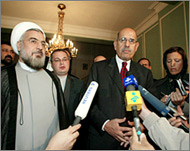Iran vows nuclear ‘transparency’
Iran has promised “total transparency” after talks with foreign ministers from Britain, France and Germany over its nuclear programme.

It has also agreed to sign up to tougher UN inspections of its nuclear programme and suspend its enrichment of uranium.
Tehran says its decision to halt its disputed uranium enrichment programme is a temporary measure aimed at fostering trust in its peaceful intentions.
“One of the agreed points was that Iran voluntarily will temporarily suspend enrichment to show its goodwill and to create new trust between Iran and other countries,” Supreme National Security Council chief Hassan Rohani told reporters.
The talks on Tuesday come amid clear signs Iran’s clerical leaders are ready to bow to mounting international pressure, just 10 days before an International Atomic Energy Agency (IAEA) deadline for them to come clean.
“We are ready for total transparency because we are not pursuing an illegal programme,” said Iran’s Foreign Minister, Kamal Kharazi, following a brief meeting with the foreign ministers of Britain, France and Germany.
Diplomats said the EU ministers would offer Iran some help with developing a civilian nuclear energy programme in return for its full cooperation with a tough IAEA resolution which set the deadline.
“Naturally our rights should be respected and what’s legitimate for us should be respected as well as our dignity and security,” said Kharazi, who described the talks as positive.
The three EU ministers went into talks with Iran’s Supreme National Security Council chief Hasan Ruhani immediately after the Kharazi meeting. They were due to meet President Muhammad Khatami later.
Softer tone
“We all respect the rights of any sovereign nation to have a civil nuclear programme but at the same time not to be involved in any proliferation activities,” said UK Foreign Secretary, Jack Straw, following the Kharazi talks.
 |
|
Iran’s Hasan Ruhani (L) met |
Iranian officials who insist Tehran’s nuclear programme is for electricity production, have adopted a notably softer tone on the nuclear issue in recent days.
Khatami has even hinted Iran may halt uranium enrichment, which Washington says lies at the heart of a covert nuclear arms attempt.
IAEA chief Muhammad al-Baradai has warned that Iran’s case may go to the UN Security Council if he cannot verify in his 20 November report that Iran has no intention of building nuclear arms.
Crucial moment
Describing the visit as “a crucial moment”, Germany’s Joschka Fischer warned a failure to reach an agreement would have serious consequences.
“If we can agree today, I think this would be an important step forward, if not we have a very serious problem,” Fischer said.
Kharazi said officials from the four countries were working on a joint declaration for the talks.
Diplomats said the declaration would demand Iran cooperate fully with the IAEA, sign and implement a UN protocol for tougher inspections and freeze uranium enrichment.
In return, the ministers would offer to recognise Iran’s right to a civilian nuclear energy programme, give some technical assistance and guarantee Iran’s access to imported fuel for nuclear power plants.